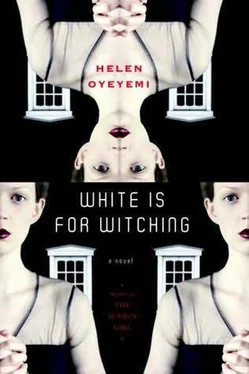In my room at college, the walls have a strange relationship with the ceiling. The room feels as if it has more than four corners. I tried to sleep, but kept waking and walking to the window, looking down onto the cobbled street and wondering where I was. I ended up opening the present my mum had sneaked into my suitcase. She thought I hadn’t seen her, but she’s no good at hiding her intentions. She can’t help tiptoeing around with a finger to her lips at key moments. The gift was a book of Caribbean legends “for storytellers,” and she’d tucked a note in between the first two pages: Tried to find a book of Nigerian ones but they all seemed to do with a tortoise! Have these and our love, we are so very proud of you — love, Mum (and Dad)
I had already bought the book for myself, with pocket money years ago. I opened it (its cover was crowded with anachronistic woodcuts of nubile women carrying water jugs on their heads)
and read my favourite story again. I read about the soucouyant, the wicked old woman who flies from her body and at night consumes her food, the souls of others — soul food! — in a ball of flame. At dawn she returns to her body, which she has hidden in a safe place.
I read to the walls. “Kill the soucouyant.” Dawn tore a rosy line through the clouds. “Find her skin and treat it with pepper and salt. How it burns her, how it scratches her. Only the night gives her her power, and if she is unable to reenter her body by sunrise, she cannot live. Kill the soucouyant, that unnatural old lady, and then all shall be as it should.”
I folded that page over at the corner and read on, no longer aloud. As always, the soucouyant seemed more lonely than bad. Maybe that was her trick, her ability to make it so you couldn’t decide if she was a monster. Still, I wondered if the salt and pepper were really necessary — they seemed too cruel when it would be easier to despatch her by blowing out her flame before it grew, or by holding a mirror up to her wrinkled face and saying, “I don’t believe in you.” But then, maybe “I don’t believe in you” is the cruellest way to kill a monster.
My mum keeps worrying that she’s not filling the space left by my birth mother. My dad was the same as well, forcing me to spend hours at the park with him and a football until he realised that, like him, I was much better at watching football than playing it, plus if I wanted to talk to him I’d do it without using sport as a crutch. But Mum… she keeps finding stuff in the African folklore section of the local library that she feels bound to tell me because she thinks my mother might have. Mum kept calling me Ore even though she really wanted a daughter called Rose. My name is not a big deal to me — if it was Rose it would’ve worked better with my surname and people would be able to spell it without that moment of uncertainty before putting pen to paper. Rose Lind is easily filed, she is a delight, she is Shakespearean, sort of. My birth mother was a legal immigrant. She and whoever my birth father was weren’t together. Aside from that, all I know about her is that she suffered from quite serious postnatal depression and couldn’t cope with me. Postnatal depression is common enough for me to assume that there were other factors that led to me being put in care. I’m assuming she hurt me, my birth mother. I wasn’t even a year old. I’m glad I don’t remember anything.
During the first few weeks, I saw Tijana every day. We went to the Freshers Fair together and debated buying membership to the union, finally deciding in favour when someone at the stall told us that not only was Ben and Jerry’s sold at the union at cheaper prices than those at Sainsbury’s, but it was sold there long after Sainsbury’s closed, too. When students handing out flyers for the Assassin’s Guild started circling us, an expression of distaste crossed Tijana’s face and she was, quite suddenly, gone. I wasn’t fast enough. One of them, a very large guy, and brooding, not unlike like a manatee with matted hair, was wearing red-and-white-checked trousers and a top hat with a tag in it for ten shillings and sixpence. He started hovering across my path, his arm out, doing something very like cornering me, smiling and cajoling, saying I looked like the sort of girl who was really game. Game for what? Pretend murder. I smiled, took a flyer, then pretended I saw someone I knew and strolled away without looking back.
Someone else called out to me from a stall — their accent was African—“Hello my sister!” I knew he was only joking, but I bridled anyway. He was tall and shaven-headed, good-looking if you liked tall and shaven-headed, wearing a Harvard sweatshirt as a nice touch of irony. He waved his clipboard at me. “You should put down your e-mail address for the Nigeria Society mailing list,” he said.
I frowned and said “No,” and tried to pass him, but he pressed a leaflet into my hand anyway. I walked away with it, wanting to drop it on the floor, but I thought he might still be watching, then wondered why I cared if he was watching, then wondered why I was so upset. Because I was upset.
Tijana caught up with me, looking pleased with herself. “What were those strangely dressed people?” she asked. I told her, but she’d already lost interest and plucked at the leaflet in my hand. “What’s that? The Nigeria Society? Did you sign up?”
“Nope.”
“Why not?”
(I will really resent you if you persist with this)
“Too busy.”
“For what? Don’t you want to meet people? I think you should join.”
“Yeah? And why don’t you join the fucking refugee society?” I knew as soon as I said it that she would probably never speak to me again. If I were her I would never speak to me again. I walked away to spare her the trouble of having to get away from me. Wanker. I was such a wanker. I gritted my teeth and ran across Parker’s Piece, slapping savagely at lampposts as I passed them. I was almost back at college when I noticed Tijana was walking silently behind me. She smiled when I looked at her.
“I didn’t mean to say what I said,” I said.
“I know,” she said. “I could hear you calling yourself a wanker this whole time.”
She tutted, hugged me and kissed my cheek. I hugged her back, harder.
In the first couple of weeks I only caught glimpses of Miranda — Miranda in the phone booth across from our college, dialling, waiting and hanging up, dialling, waiting and hanging up. I saw her leaving the college library one morning, her arms crammed with more books than we were allowed to take out.
“How’s it going?” I asked her.
“I’m just trying to read everything I can,” she said. She seemed out of breath.
“You’ve got all term,” I said, and she nodded politely and wobbled away.
Miranda wasn’t among us gowned girls in cocktail dresses at formal hall. She didn’t come to the Freshers Week events, she didn’t watch TV in the common room, she wasn’t anywhere. I remembered something from a short story I’d read, about how the girl you want is the girl you see once and then she is nowhere to be found. The girl who does not appear in the crowded room.
Tijana and I got into the habit of 2:00 AM visits to the Van of Death. Apart from the men who worked the van, we were often the only sober people there. Everyone else was on their way back from a club or something. As we stood in queue, watching fat melt and resolidify between busy spatulas and the heat of the grills, I heard someone behind me, probably an English student at our college, mention the name Miranda Silver. I eavesdropped intently then, but all the guy said was that she was an affected little goose. “She almost didn’t go to matric dinner, you know. She said she didn’t care for dinners, and compared cutlery to cages.”
Читать дальше












